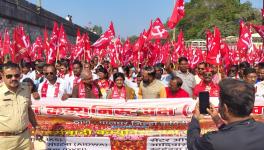SC to Hear Petitions Challenging Abrogation of Art 370, Issues Notice to Centre
Image Courtesy : The Hindu
The Supreme Court referred the petitions challenging the abrogation of Article 370 in Jammu and Kashmir and bifurcation of the erstwhile state into two union territories to a Constitution Bench consisting of five judges on Wednesday, August 28.
According to Live Law, a bench consisting of Chief Justice of India Ranjan Gogoi, and Justices S A Bobde and S Abdul Nazeer said that the matters will be heard in October.
The SC notice comes after the court overruled the opposition from Attorney General KK Venugopal and Solicitor General Tushar Mehta, who had argued that the if notice is issued, other countries may make use of the issue against the country in international platforms.
Live Law reported that AG Venugopal had argued that Pakistan might use the Kashmir issue against India in the United Nations, while SG Tushar Mehta had said, "The matter has grave cross border implications."
The bench considered as many as 14 petitions on the issue, which included petitions challenging the restrictions on press imposed in the valley, curfew imposed in the region and those challenging the validity of the Presidential Order abrogating the special status granted to the state under Article 370 and also the Jammu and Kashmir (Bifurcation) Act 2019 that bifurcated the state into Union Territories of J&K and Ladakh.
The first petition challenging the Presidential Order was filed by advocate M L Sharma. Bar & Bench reported that following this, “a Kashmiri lawyer, Shakir Shabir had approached the Supreme Court of India challenging the Presidential Order of August 5. It was his argument that amendment to Article 367 which resulted in the scrapping of Article 370 could not have been done in the manner in which it was done. It could have been done only by the Parliament.”
Other petitions filed in this regard included those filed by National Conference leaders Mohammad Akbar Lone and Hasnain Masoodi, petition of civil servant-turned-politician Shah Faesal and Shehla Rashid.
Meanwhile, another petition filed by Anuradha Bhasin, executive editor of Kashmir Times, contends that “the shutdown of internet and telecommunication, the severe restrictions on mobility and the sweeping curtailment on information sharing, at a time when significant political and constitutional changes are being forged by the Parliament to the status of Jammu and Kashmir, violate the freedom of speech and expression under Article 19, the right of the public to information and the right to practice one's profession.”
The plea filed by activist Tehsin Poonawalla, which makes similar prayers for the relaxation of restrictions imposed in the valley was also considered in the Court. The bench tagged the case with Bhasin’s petition.
As per Live Law, the bench also allowed Communist Party of India (Marxist) general secretary Sitaram Yechury to travel to Kashmir. Yechury had challenged the detention of CPI(M) MLA Mohammad Yousuf Tarigami, and filed a habeas corpus petition arguing that the 72-year-old leader’s health was suffering. However, the CJI-led bench added that the visit should not be used for political purposes.
Get the latest reports & analysis with people's perspective on Protests, movements & deep analytical videos, discussions of the current affairs in your Telegram app. Subscribe to NewsClick's Telegram channel & get Real-Time updates on stories, as they get published on our website.
























